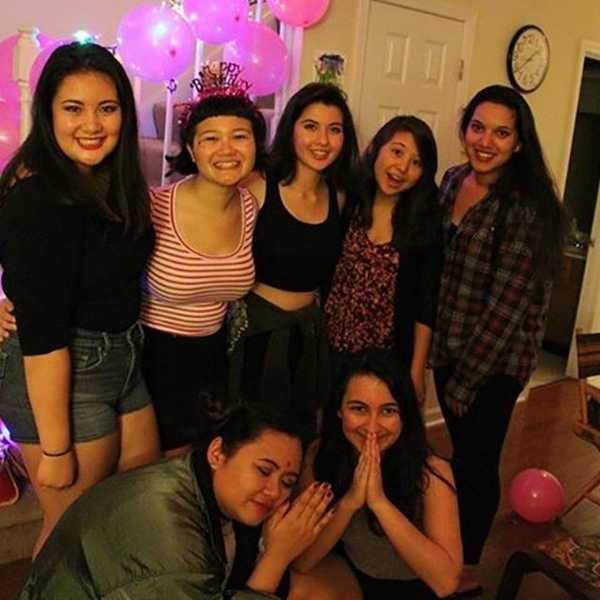"So like, where are you from?"
"America."
"No, I mean, where are you really from?"
"America. My parents are from China."
In fifth grade, I was walking up the stairs when a kid stopped me and said, "Elizabeth Chan? I thought you moved back to China!"
Two weeks ago, my best friend Heather, who happens to be Chinese, was walking around the gym at the pep rally, and a kid she has never met said, "Move, chink."
During a Socratic seminar, the student moderating the discussion that day called me Heather. This happened twice that year with the same person.
Since middle school, I have been mistaken for "some other Asian girl" who "looked just like me." I'm not offended by being mistaken for someone else except for the automatic and ignorant grouping of all Asians into one person. Just earlier today, someone asked, "Oh, you're Heather, right?"
A few years ago, I signed up for summer courses on bullying, CPR, and police safety that bring in students from all around Roswell. At the first and only program I attended, I entered the room and didn't recognize a single face. That itself made me feel quite different. I sat alone before the course began; then I turned to my right and noticed a group of boys looking in my direction and laughing. I heard the words "chink" and "ching" and "chong" and "cho." I felt my face immediately turn red, and I felt extremely embarrassed. After quite a bit of convincing, my mom agreed to remove me from the other programs I had signed up for.
On October 9, New York Times journalist Michael Luo published an article about his encounter with a woman who told him and his family to "go back to your fucking country." He describes the harassment that many Asian-Americans have faced and addresses how important this issue is, particularly with the racial tensions in America today. "#Thisis2016," he calls it. This hashtag on Twitter has become a minor outlet for Asian-Americans to share the racist remarks that have been thrown at them as well.
Being called the wrong name is awkward, uncomfortable, and disappointing, even after dealing with it my entire life. More often than not, the people doing it don't actually realize it until they hear the sound of laughter from others or see a still and unresponsive look on my face. Sometimes it makes me feel like I don't have an identity in America. I'm grouped with other Asians who might be Korean or Indonesian or even Chinese, but we are not the same. Yes, we all come from Asia, but we have our own distinct cultures and our own identities, just like the French and Germans who come from Europe have very different cultures. I am, in fact, Elizabeth. I am Chinese, but I am also American.
In the past week, several teachers and students at my high school called me by the name of one of the other Asian girls at our school. It's difficult to describe the instant emotional reaction I had. I used to take it lightly and just brush it off, but I have recently realized that nothing has changed since elementary school. It may have even gotten worse. We are still mistaken for others who supposedly "look like us." We are still called "chinks" and harassed because of our small "slit eyes." We are still told to go back to "our country" as if America, the country we were born in and live in, is not our home.
In my early elementary school years, I wasn't proud of my culture- where I came from, where my own parents, who worked tirelessly and immigrated with less than one hundred dollars, came from. I felt out of place and truly believed that more people would talk to me or ask to go on play dates if I was white. I felt embarrassed about being Chinese and "looking different" from everyone else there.
Throughout elementary school, the racist remarks never really got to me. I'd be slightly irritated, but for the most part, I accepted it as something I'd just have to deal with for the rest of my life. That mindset still holds true, to an extent. In the future, my children may face harassment like I did, but the first step to changing society's perception of Asian-Americans and their cultures is to address the issue - to bring awareness to it. The first generation of immigrants, like my parents, generally did not react if someone harassed them. I know personally that my parents, and probably most Chinese immigrants, really just wanted to escape communist China and live a peaceful, normal life in America. My generation, the second generation, raised in a democratic nation, is speaking out against the racism. No longer will I be like my passive younger self if I'm called a "chink" or made fun of for having "small Asian eyes." No longer will I be ashamed to be a Chinese-American.
If I could talk to my younger self, I'd say: embrace your Chinese-ness. The qi pao's, the smell of vinegar when you get home, the Bruce Lee films. And be thankful for Mom's homecooked Chinese meals. Be thankful for the routine of drinking soup, then eating rice and having numerous vegetable dishes to choose from. Oh, and be thankful that you know how to use chopsticks - it makes eating a lot easier.





















